AAALetter - September 2018
Volume 30, Number 2
Table of Contents
- From the AAALetter Editor—Overview by Fabiola Ehlers-Zavala: Welcome to the Fall issue of the
AAAletter ! In this issue, our President Linda Harklau discusses challenges and opportunities forAAAL, and introduces new initiatives members of Executive Committee (EC) and others are working on! Our 1st VP and Conference Chair, Laura Collins, offers apre-view of the upcoming AAAL conference in Atlanta. Read More. - From the President—Linda Harklau: Happy new academic year to those of us in North America and Europe, and I hope the year is going well for those of you in other parts of the world. Read More.
- Mark the dates – AAAL 2019 will take place from March 9 – 12, 2019, at the Sheraton Atlanta Hotel, in Atlanta Georgia. While we intend to keep you quite busy with all the events we are planning for the conference, the city of Atlanta offers you many culinary, cultural, and leisure activities to enjoy. Read More.
- From the Secretary—AILA Update by Fabiola Ehlers-Zavala: This year’s AILA Executive Board and International Committee Members (AILA EBIC) took place in Groningen, on June 3-4, and being AAAL Secretary, I had the opportunity to represent our organization at those meetings. Read More.
- From the Secretary—AAAL Election Results by Fabiola Ehlers-Zavala: Many thanks go to everyone who contributes to the AAAL election process (Chair, Committee, staff, and voting members!). Read More.
- From ARAL: Updates from the Annual Review of Applied Linguistics (ARAL). Read More.
- From the Graduate Student Council (GSC): Each year AAAL confers awards to graduate students who have written an outstanding proposal for the conference presentation. This piece introduces the award selection process and the six award winners from AAAL 2018. Read More.
- From the Public Affairs & Engagement Committee (PAEC): The Public Affairs & Engagement Committee (PAEC) is
a AAAL standing committee that was formed in December 2016. It provides “an important means by which AAAL members can bring their collective expertise to bear on issues of social importance and inform public debate by speaking to issues of social and professional relevance” (AAAL Standing Rules). Read More. - Member Spotlight: In this issue of the AAALetter, I have asked Carolin Fuch to share more about her background with the AAAL membership, as she will be contributing important leadership to AAAL as Chair of the AAAL Ad Hoc Committee on Online Education and Outreach, which our President, Linda Harklau convened this past July 2018. Read More.
- Procedures for Submitting Resolutions: The resolution process is an important means by which AAAL members can make their voices heard on issues internal to AAAL’s governance and operations. Read More
.
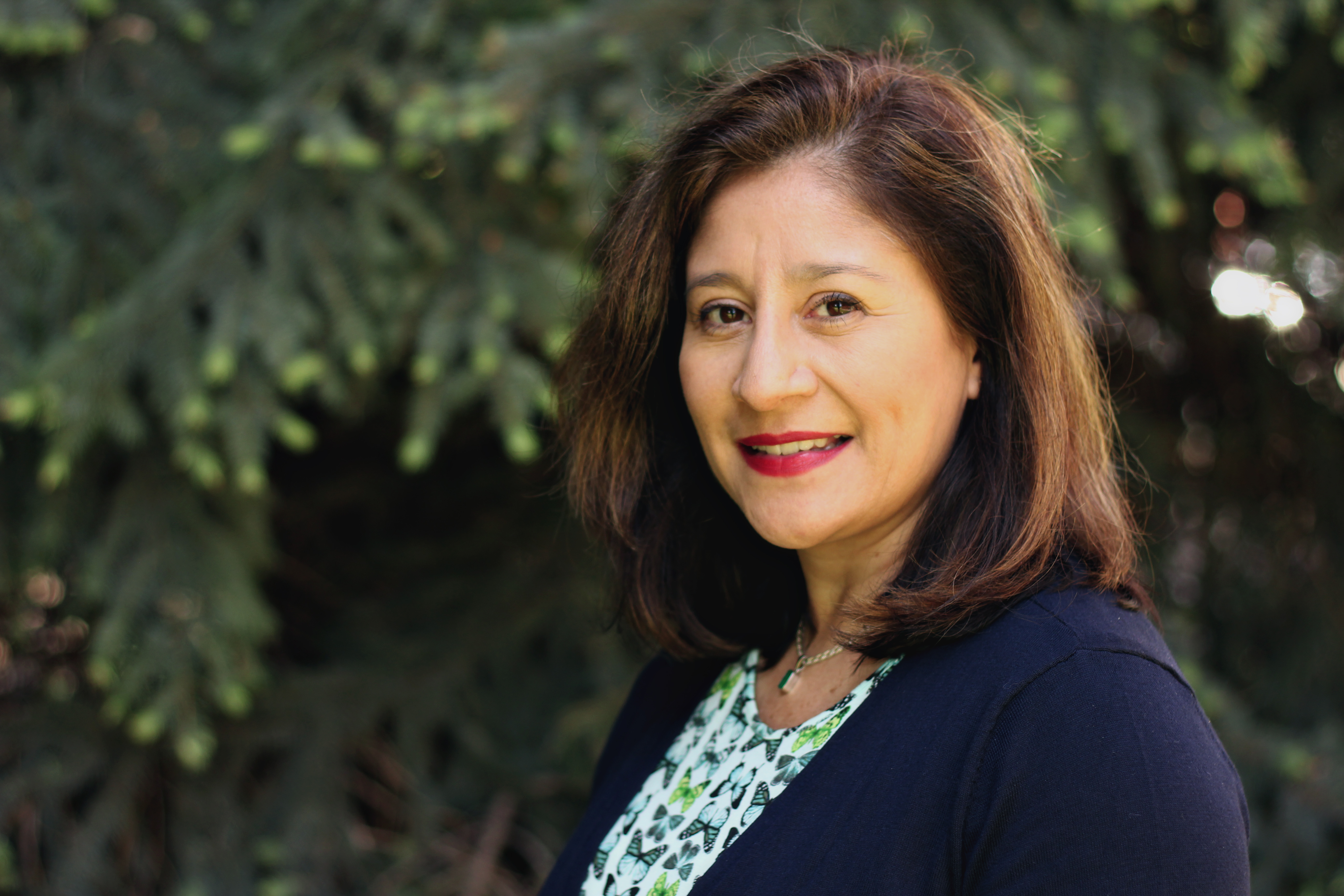
Welcome to the Fall issue of the
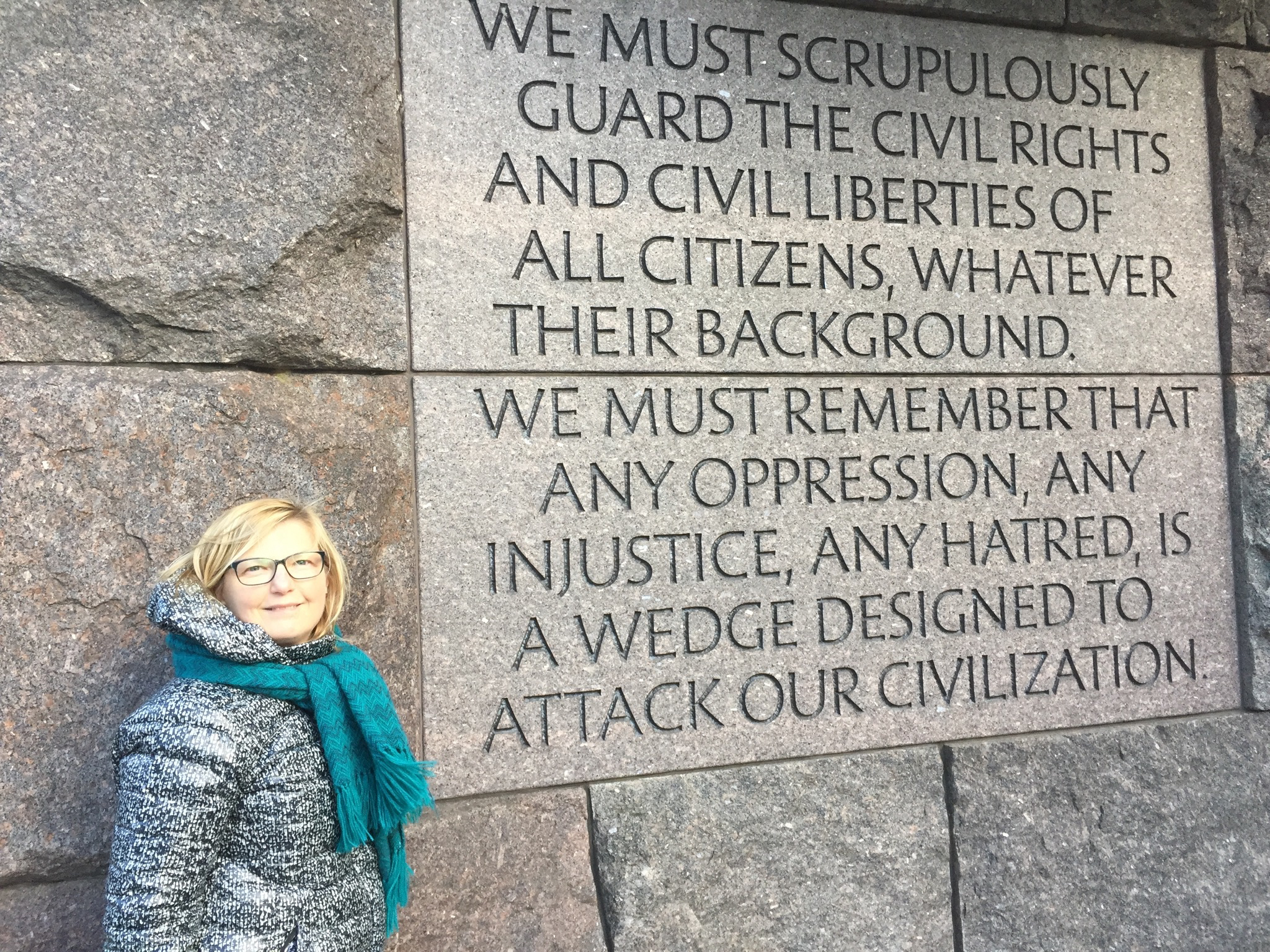
Happy new academic year to those of us in North America and Europe, and I hope the year is going well for those of you in other parts of the world.
AAAL has been very busy behind the scenes this spring and summer. First, we have transitioned to a new website. Kudos to our very capable business office staff who made this change with minimal disruption to the membership. AAAL has also adopted a new conference proposal management system. This has been a big change, but it was also long overdue. While there will undoubtedly be a few glitches and surprises in the coming year, I’m confident this will be a big improvement. Laura Collins, First Vice President and Conference Chair, and her conference team have done an admirable job of preparing for the new system on top of her already significant responsibilities for the Atlanta 2019 conference.
Beyond these routine but vital administrative changes, AAAL also has some bigger issues to consider. As an
Another major issue that we continue to address is how to make AAAL more inclusive and diverse, and to build
Lastly, in the spirit of inclusiveness, I urge everyone to make your opinions known and volunteer for positions in AAAL. First, vote in AAAL’s elections. The leadership you select is very consequential for the future direction of the association in years to come. Second, use the space provided at the end of the annual election ballot to nominate yourself or others to serve in AAAL as a proposal reviewer or strand coordinator, a committee member, or in the association leadership. Look for the ballot in early summer every year. Also, fill out the member surveys that come your way. The Executive Committee pays close attention to the responses to these surveys, but less than 15% of the membership responded to the last survey. Another way to get involved is to participate in initiatives sponsored by AAAL’s Public Affairs and Outreach Committee and attend the annual Public Affairs Event at the Atlanta conference. If you are a graduate student, get involved in AAAL’s dynamic Graduate Student Council. It may sound trite, but it is nonetheless true that AAAL depends on the generosity of hundreds of members who give their time as unpaid volunteers, and we need the contributions of many to keep the association vibrant

Mark the dates – AAAL 2019 will take place from March 9 – 12, 2019, at the Sheraton Atlanta Hotel, in Atlanta Georgia. While we intend to keep you quite busy with all the events we are planning for the conference (see below), the city of Atlanta offers you many culinary, cultural, and leisure activities to enjoy. Atlanta is also frequently described as the most forested urban area in the USA – this guide (https://www.myajc.com/news/local/atlanta-trees-you-should-know/tZhl6XZvDhXmrZbMvQwmQN/ ) will direct you to some of the exceptional tree specimens on offer. Not far from the conference venue is an innovative urban project to bring soccer (football) to the inner city through the construction of a soccer pitch on the roof of the Five Points subway station. It was recently featured in the Guardian newspaper (https://www.theguardian.com/football/2018/apr/18/atlanta-subway-soccer-fields-marta-streets)
As for AAAL 2019, you can look forward to the following five plenary talks:
- Nick Ellis, University of Michigan: “Usage-based Language Acquisition: Implicit and Explicit Learning and Their Interface"
- Lenore Grenoble, The University of Chicago: “Language Vitality and Sustainability”
- Emma Marsden, University of York: “Open Science and Applied Linguistics: Opportunities and Challenges”
- Patsy M. Lightbown, Concordia University and Nina Spada, University of Toronto: “In It Together: Teachers, Researchers, and Classroom Second Language Acquisition”
- Iñaki Zabaleta, University of the Basque Country (UPV-EHU): “Minority Language Media: Framing Their Reality, Development
and Roles”
There will also be five invited colloquia organized by the following scholars:
- Scott Crossley, Georgia State University: “Let’s Automate: Natural Language Processing Tools and Their Applications”
- Diane Dagenais, Simon Fraser University: “Expanding the Applied Linguistics Lens on Multiliteracies: Sociomaterial Assemblages” [Wilga Rivers Language Pedagogy Colloquium]
- Luke Harding, Lancaster University: “Assessing Lingua Franca Competence” [Joint AAAL/ILTA Colloquium]
- Shannon Sauro, Malmö University: “Fan Practices for Language and Literacy Development”
- Paul Toth, Temple University: "What Do the Data Show? Multiple Theoretical Perspectives on Learning in a Single Classroom" [Language Learning Roundtable Colloquium]
Two pre-conference workshops will be scheduled on the afternoon of
There will also be talks by the recipients of the Distinguished Scholarship and Service and Distinguished Public Service Awards, and the events currently being planned by the Graduate Student Council. And, of course, there will be the hundreds of papers, colloquia, roundtables, and poster sessions that make up the bulk of the program.
Indeed, we are currently in the midst of reviewing proposals for presentations for the conference, with the aid of 23 strand coordinators and hundreds of reviewers who have generously offered their time and expertise. They are supported by my superb conference organizing and planning team: colleagues Dr. Mela Sarkar (McGill University) and Dr. Walcir Cardoso (Concordia University), and Concordia University doctoral students June Ruivivar (Associate Chair and Strand Coordinator Liason), Clinton Hendry, and Lauren Strachan. This review process is being accomplished through our brand new proposal system, put together for us by Confex, accessed through our brand new website platform! There were some delays launching the system, some transition time as members changed their passwords to log onto the new platform, and, as was to be expected, some glitches in the proposal platform as the review process began. However, we have been pleased with the rapid response of Confex and the continued vigilance of our AAAL management team in addressing the issues as they have arisen. We also appreciate the patience and professionalism of the strand coordinators and reviewers as the first-time users of the system. Many have taken the time to comment
We are also delighted to announce that Georgia State University will be hosting a reception on their campus for AAAL attendees on the evening of
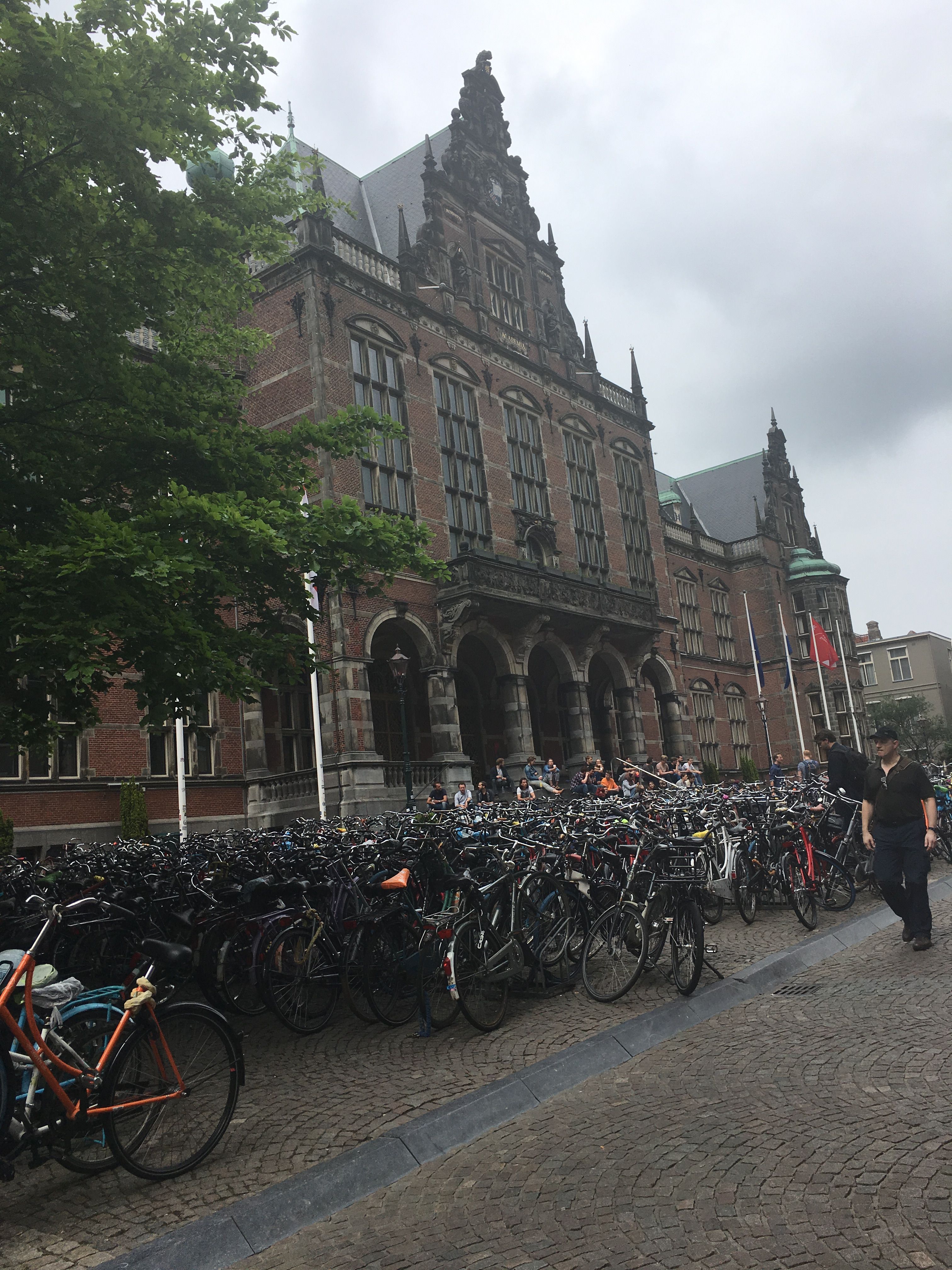 From the Secretary—AILA Update by Fabiola Ehlers-Zavala
From the Secretary—AILA Update by Fabiola Ehlers-Zavala
This year’s AILA Executive Board and International Committee Members (AILA EBIC) took place in Groningen, on June 3-4, and being AAAL Secretary, I had the opportunity to represent our organization at those meetings. In addition to the representatives of the AILA Executive Board (EB), there were 15 members from the International Committee (IC) representing various committees, regions and countries (AILA Europe, AILA 2020, OASIS, New Zeland, USA, South Korea, Japan, The Netherlands, Austria, Germany, Lithuania, France, Ireland, France, and China). The agenda covered various aspects of the work of AILA:
- Management
- Prosperity (Finance)
- Identity (ReN Coordinator’s Report, Reports from AILA Europe, Middle East, Latin America, as well as Affiliate’s reports, Awards, and other initiatives)
- Visibility (AILA Review, AILA Applied Linguistics Series, AILA Conferences)
- Other business
Of notable importance is the effort that AILA is undertaking to position itself as “the global organization in our field—a field of high social relevance” as stated by President
MARK YOUR CALENDARS!
|
Association |
|
International Association of Applied Linguistics will take place on August 9-14, 2020, in Groningen, the Netherlands! For information on AILA 2020, please visit: http://www.aila2020.nl/ |
From the Secretary—AAAL Election Results by Fabiola Ehlers-Zavala
Many thanks go to everyone who contributes to the AAAL election process (Chair, Committee, staff, and voting members!). As Secretary, I am pleased to announce the following results:
|
Second VP |
Patsy Duff |
|
Member At Large |
Christina Higgins |
|
FFAL Trustee |
Suresh Canagarajah |
|
Nominating Committee |
Ryuko Kubota, U of British Columbia Paula Winke, Michigan State University Matt Prior, Arizona State University Emma Marsden, U of York, UK |
|
Book Award Committee |
Jasone Cenoz, University of the Basque Country, Spain Nancy Bell, Washington State University |
|
Research Article Award Co. |
Junko Mori, U of Wisconsin James Lantolf, Penn State University |
|
Dissertation Award Committee |
Yasuko Kanno, Boston University Sarah Benesh, Staten Island College, CUNY Amanda Kibler, U of Virginia |
Congratulations go to all members elected, and thanks are extended to everyone who put forward his/her name for consideration. AAAL has plenty of opportunities for involvement so individuals interested in involvement should not hesitate to reach out to us to keep them in mind as our work evolves
Alison Mackey, Editor-in-Chief of ARAL;
Kendall King, ARAL Editorial Board Member
Lara Bryfonski, ARAL Editorial Assistant for 2016 & 2018.
ARAL is #1 of 181 journals in Linguistics:
The Annual Review of Applied Linguistics (ARAL) is delighted to announce it has been ranked as the top journal (1/181) in the Linguistics category of the Journal Citation Reports © Clarivate Analytics with a 2017 Impact Factor of 4.880. All AAAL members have free online access to the journal as part of their membership (https://www.aaal.org/). To mark this news, Cambridge is making the three most-cited papers from 2017 freely available until the end of October, so you can easily forward the papers or links to colleagues or students who might not be AAAL members.
ARAL’s authors are winning awards:
ARAL has gone from strength to strength on the basis of the work of its contributors. Ron Darvin and Bonny Norton won the TESOL International Award for Distinguished Research for their article “Identity and a Model of Investment in Applied Linguistics” in 2016, and Andrea Révész and Laura Gurzynski-Weiss won the same award for their article “Teachers’ Perspectives on Second Language Task Difficulty: Insights From Think-Alouds and Eye Tracking” for their article in 2017. Congratulations to all!
Latest updates to ARAL include new short papers section and student contribution:
For the first time in ARAL’s publication history, we began in 2016 to include articles that reported on empirical data, along with the traditional review-only articles and position pieces. In 2018 we have made two more updates. First, we now include a section of short papers (up to 2,000 words, as opposed to the usual 6-8,000 words). These papers concisely examine a variety of current issues in international language learning. Second, in another first for ARAL, in this short paper section, each issue will now include a student-only authored article, alongside the papers from seasoned researchers. As it has always done, ARAL’s editorial board selects topics, themes
Another update from 2018 is Open Science Badges:
Another new development introduced with the 2018 volume is that authors are now able to qualify for an open materials badge (via disclosure) by uploading their materials to IRIS (Instrument Repository for Research into Second Languages) or any other permanent online repository, and by complying with the Center for Open Science initiative’s TOP (Transparency and Openness Promotion) Guidelines, self-described as “a community-driven effort to align scientific
2018 Issue is on International Language Learning:
Volume 38 (2018) is on International Language Learning with articles available through FirstView. The volume explores this theme through research carried out in highly varied settings, including the multiple
Contributors to the 2018 international issue include Dan P. Dewey, R. Kirk Belnap and Patrick Steffen; Judith Kroll, Paola Dussias, and María Teresa Bajo Molina; Celeste S. Kinginger and Qian Wu; Naoko Taguchi and Noriko Ishihara; Li Wei and Wing Yee (Jenifer) Ho; Lara Bryfonski and Cristina Sanz; Hang Du; and ZhaoHong Han. The short papers are written by Kendall King and Martha Bigelow; Sheena Shah; Shondel J. Nero. The student contribution came from Hasibe Kahraman and Ashleigh Pipes and based on data they collected in Turkey. In these 2018 articles, authors investigated international language learning in a wide range of contexts including: Arabic learners in Jordan, ethnic minority students in China, American study abroad students in Spain, teacher training in The Dominican Republic, L3 teachers in Turkey, and East African students in the U.S., along with syntheses that cover a range of contexts. Our authors come from universities in the U.S., the U.K., Canada, Japan, Spain, South Africa
The focus of the 2017 issue was Younger Second Language Learners, and it explored the theme of child second language acquisition from a wide range of disciplinary perspectives in varied contexts. 2017 was one of the largest issues to date with a long and distinguished contributor list. All topics covered by ARAL in its previous 38 years of its history can be found on the website (https://www.cambridge.org/core/journals/annual-review-of-applied-linguistics).
2019 is on technology:
We are also excited to announce the upcoming (2019) volume will be on the topic of Technology in Applied Linguistics Research. We’ll have more updates about the contents of this issue in the next AAAL newsletter

Each year AAAL confers awards to graduate students who have written an outstanding proposal for the conference presentation. This piece introduces the award selection process and the six award winners from AAAL 2018.
Award Selection Process
All graduate students who submit a proposal for a single-authored paper are eligible to apply for the award. The application is invitation-based—that is, the 20 top-ranked conference proposals by graduate students are invited to apply for the award. Six graduate students have been selected each year but AAAL, along with the GSC steering committee, is making every effort to increase the number of awards. You may find additional information on the award at the AAAL website.
2018 Graduate Student Award Recipients
The conference can often be a hectic time to learn more about the award recipients. This section features this year’s six graduate student awardees to give more of the recognition they deserve. Below includes each winner’s bio and
Angelica Galante, University of Toronto (Multilingual Matters Award)
Angelica is Assistant Professor in Applied Linguistics at Concordia University. She completed her Ph.D. in Language and Literacies Education at OISE/University of Toronto. Her research titled Monolingual or Plurilingual? An experimental study investigating the effects of plurilingual instruction in an EAP program at a Canadian university was the recipient of the 2018 AAAL Multilingual Matters award and investigated affordances and challenges of plurilingual instruction compared to monolingual instruction. Results suggest that plurilingual instruction is more effective than monolingual instruction on several dimensions, including the development of plurilingual and pluricultural competence (PPC), cognition, and empathy, among other factors.
Alexandra Martin, Georgetown University (Wilga Rivers Award)
Alexandra holds an M.A. from the Universidad de
Hyeyoon Cho, University of Toronto
Hyeyoon is a Ph.D. candidate at
Jeffrey Scott Maloney, Michigan State University
Jeffrey is a recent graduate from the Second Language Studies Ph.D. program at Michigan State University. His primary interests include
Junichi Yagi,
Junichi Yagi is a Ph.D. student in Second Language Studies at the University of Hawai’i at Mānoa. His research mostly focuses on a ‘performative’ aspect of second language interactions in non-verbal domains. Currently, he is interested in how participants from different linguistic backgrounds jointly accomplish music and sports as a social practice through their in situ, methodical deployment of language and other embodied semiotic resources (e.g., gesture, eye gaze). His award-winning paper (AAAL 2018) illustrated how enactment could be used by L2 speakers as a method of explaining an unfamiliar Japanese word in a lunch-table conversation.
Leah Carey, University of Minnesota
Leah is a second-year
Rayoung (Rae) Song is a Ph.D. candidate in language, literacy, and culture in the College of Education at the University of Massachusetts Amherst. She serves as the co-chair of the GSC Steering Committee. Her responsibilities include planning and leading Steering Committee meetings, overseeing the two graduate student events at the AAAL conference, and collaborating with the AAAL conference planning committee
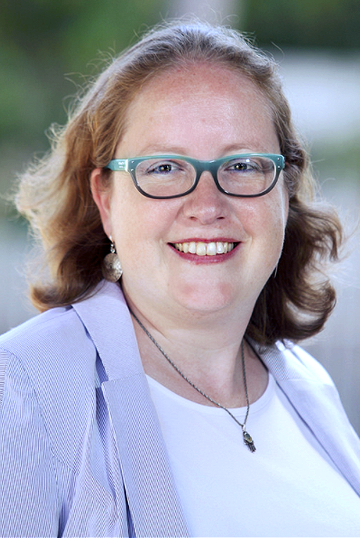
The Public Affairs & Engagement Committee (PAEC) is
How to Get Involved:
We encourage AAAL members to join the Applied Linguistics & Social Justice listserv (150 members strong). This is an online collaborative space for sharing ideas, resources, publications, and initiatives focused on applied linguistics and social justice. If you would like to be added to this list, please contact the AAAL Public Affairs & Outreach Committee Chair Netta Avineri (PAEC@AAAL.org).
AAAL members can also get in touch with ideas for projects and initiatives of social concern. Please feel free to contact Netta Avineri at paec@aaal.org with your ideas!
The Public Affairs & Engagement Committee (PAEC) is also encouraging AAAL members to create "Applied Linguistics Briefs.” These briefs are 1-2 page summaries of applied linguistics topics of interest to the general public. Below is more information about the Applied Linguistics Briefs.
“Applied Linguistics Briefs”
Description: A 1-2 page resource/
A digestible understanding of how Applied Linguists/
Focus: How do we impact/support/develop/relate to X area of societal interest?
Purpose: Education, awareness-raising, could also be used for advocacy
Format/Register:
Platform: on the AAAL website
If you have questions and/or are interested in potentially writing or collaborating on an Applied Linguistics Brief please send a note to NettaAvineri (paec@aaal.org). The PAEC is happy to facilitate the writing process for the briefs
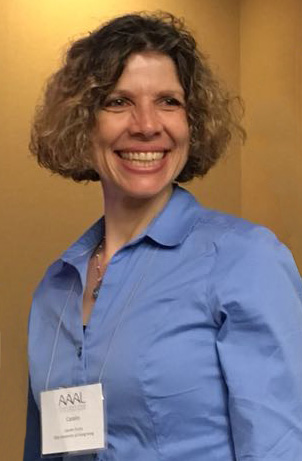
In this issue of the AAALetter, I have asked Carolin Fuch to share more about her background with the AAAL membership, as she will be contributing important leadership to AAAL as Chair of the AAAL Ad Hoc Committee on Online Education and Outreach, which our President, Linda Harklau convened this past July 2018.
Carolin Fuchs is Assistant Professor in the Department of English at
Below, Carolin shares her thoughts on her new assignment with AAAL:
I feel fortunate to have been able to attend the AAAL annual conference since 2006 because I owe many of my virtual exchange projects to the conference’s international draw and appeal.
Though “American” begins the name, AAAL attracts scholars from over 50 countries worldwide, and 25 percent of its members come from outside the United States. To reach out to those members who may not be able to attend on a regular basis, AAAL has recently founded the Ad Hoc Committee on Online Education and Outreach. The committee is tasked with the vital work of promoting and facilitating virtual access to AAAL’s scholarly community.
I am honored to serve as chair of this committee, and pleased to introduce its members: Michael Amory, The Pennsylvania State University; James Coda, The University of Georgia: Sébastien Dubreil, Carnegie Mellon University; Christoph Hafner, City University of Hong Kong; Yu Jung Han, The University of Rochester; Mirjam Hauck, The Open University;
With this exciting and critical initiative, we seek to strengthen existing opportunities for scholarly and professional networking by creating new channels for communication; results from the most recent AAAL member survey showed increased interest in online educational content and outreach materials. We thus see as our primary goals providing access to resources for professional development in supporting educators, and creating a wider dissemination of theoretical and empirical research generated by scholars across the globe. In addition, in accordance with the objectives set forth in the AAAL strategic plan, we intend to make specific recommendations, linked through our homepage, for identifying and making accessible, specific web content to the wider public. Our committee is also planning to continue building on existing social media platforms such as Twitter (https://twitter.com/aaalinks?lang=en) and Facebook (https://www.facebook.com/AAALORG/), and to bundle our online and international expertise in a commitment to
As I look to the promising year ahead for the field of applied linguistics, I warmly thank all members on the committee for joining me, with skill and enthusiasm, in helping to move this much-needed initiative forward in the coming months. I am particularly excited about including members from the Graduate Student Council (https://www.aaal-gsc.org/) and look forward to synchronizing our outreach activities. Finally, and above all, I very much appreciate this opportunity to both serve AAAL and work with a talented and distinguished team of colleagues as we foster online access and resources widely and comprehensively
The resolution process is an important means by which AAAL members can make their voices heard on issues internal to AAAL’s governance and operations. The Resolutions Committee is charged with the responsibility for processing all resolutions proposed by the membership before they are acted upon by the general business meeting of AAAL, including those calling for
Click here for information on the procedures for submitting resolutions.
